

Yesterday Mother Jones’ Kevin Drum drew some disheartening conclusions from the budget deal worked out between Congressman Paul Ryan and Senator Patty Murray – the much-lauded compromise that is headed for passage, barring some last-minute Tea Party putsch in the House. Sure, Drum allowed, the budget’s entitlement cuts were almost too tiny to notice, and along the way some sequester reductions were restored. But that wasn’t the point.
“Two years ago,” Drum wrote, “Ryan’s budget was basically at the outer limit of mainstream conservative wish lists. Today it looks tame . . . Republicans have massively changed the spending conversation since 2010. Austerity has won.”
The fact remains that many in the political media are applauding the new budget as a triumph of realpolitik simply because it defuses the threat of a determined minority taking down the world economic order – a threat that has become the new baseline in budget negotiations.


Several leading port trucking companies have taken a bold new position in the ongoing battle over whether or not they are misclassifying drivers as independent contractors. In recent filings with the U.S. District Court, they have attempted to position themselves as beyond the reach of California’s employee protection laws. In effect, they are saying that whether or not they are misclassifying drivers there is nothing the State of California can do about it.
Some background: Of the approximately 12,000 port truck drivers in Southern California – about 110,000 nationwide – the overwhelming majority are improperly classified as “independent contractors.” This has dramatic repercussions, as these low-income, mostly immigrant drivers are thereby denied basic workplace rights and protections: no minimum wage or overtime or OSHA protections, no disability or workers comp or unemployment insurance, no legal right to organize a union. Instead, drivers are saddled with payments for the trucks they drive,
» Read more about: Trucking Companies to California: Your Puny Laws Don’t Apply to Us »
 The Los Angeles County Department of Children and Family Services (DCFS) strike has been on my mind. Prior to leaving this April after nearly 12 years of service, I thought I would retire from DCFS. Even though I am no longer employed by DCFS and no longer in Los Angeles, I still feel connected to the social workers that do this work.
The Los Angeles County Department of Children and Family Services (DCFS) strike has been on my mind. Prior to leaving this April after nearly 12 years of service, I thought I would retire from DCFS. Even though I am no longer employed by DCFS and no longer in Los Angeles, I still feel connected to the social workers that do this work.
The strike started on December 5 when contract negotiations stalled. An unresolved issue is that of the Children’s Social Worker caseload for children and families who have abuse or neglect issues. High caseloads have been a long-standing issue even before this round of negotiations. One child is counted as one case. A child’s case goes through several service phases – from investigation to adjudication to offering services to maintain a child safely at home, or to reunify a the child with his parents once a family interfaces with DCFS.
» Read more about: Why I Support the Social Workers Strike »


“Give and it shall be given unto you is still the truth about life.” 
D.H. Lawrence said that almost a century ago. Now we can read scientific evidence that this statement is true. How much we have or how much we earn does not make us happy. How we spend what we have is what makes us happy and the more that spending connects us to other human beings, the happier we are. Giving – to another person or through a charitable organization – is the deepest connection we can make.
While the conclusions of Happy Money, a book by research academics Elizabeth Dunn and Michael Norton, demonstrate that happiness and giving are closely connected, they also indicate that giving boosts our odds of living longer and healthier. Furthermore, the authors say, when a man in an experimental situation gave more to someone needy,
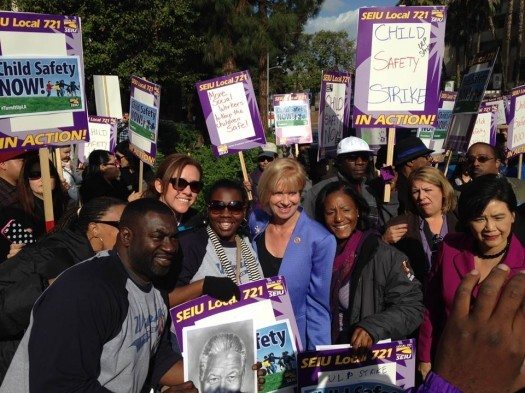

Last week Los Angeles County Children’s Social Workers went on strike after contract talks with the county broke down. At the heart of the conflict are claims made by the CSWs that the Department of Public Social Services and the L.A. County Board of Supervisors have refused to include in a new labor agreement a binding commitment to reduce the number of employee caseloads. The CSWs, represented by the Service Employees International Union Local 721, say the caseload numbers “greatly exceed acceptable industry standards.”
This morning at 11 a.m., union members, along with community and faith leaders, will take their complaints to field offices of the five supervisors: Gloria Molina, Zev Yaroslavsky, Don Knabe, Mark Ridley-Thomas and Mike Antonovich. The chief focus of Monday’s strike rallies will be Molina’s El Monte office, at 3400 Aerojet Avenue.
Local 721 claims the support of U.S. Congresswomen Janice Hahn and Judy Chu,
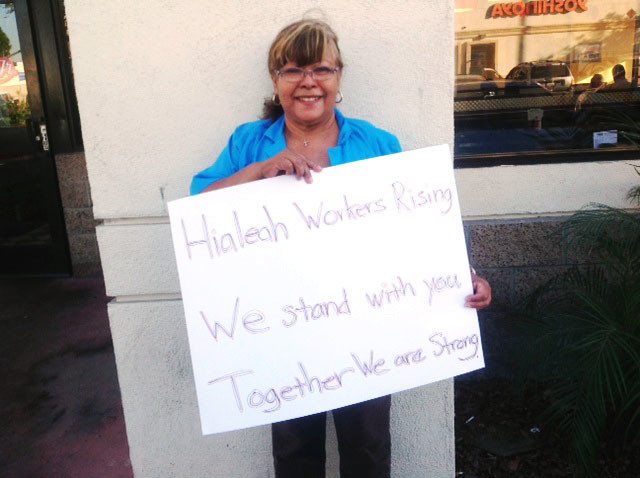
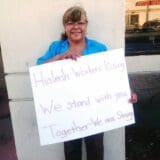
November, 2013 was not a good month to be a Walmart corporate executive.
The headaches for the nation’s largest employer of low-wage workers began November 18, when the National Labor Relations Board found that Walmart illegally threatened, disciplined and fired employees over last year’s Black Friday strikes and protests. The finding was the first step in an NLRB complaint asserting that the retail giant violated workers’ rights.
The Black Friday protests have been a driving force behind the core demand by Walmart employees that the company raise the annual earnings for sales associates above the federal poverty line.
That NLRB bombshell soon snowballed into a public relations disaster when, on the same day, news broke that a Canton, Ohio Walmart store had instituted a Thanksgiving food drive on behalf of store employees unable to afford a holiday meal. The Canton story was subsequently credited with reigniting the congressional fight for the first increase in the national $7.25-per-hour minimum wage since 2007.


 Thursday’s one-day strike by fast-food workers may have received relatively little media coverage, but the doubling of strike sites to 100 cities over the previous nationwide actions showed the movement for higher wages and union recognition is growing.
Thursday’s one-day strike by fast-food workers may have received relatively little media coverage, but the doubling of strike sites to 100 cities over the previous nationwide actions showed the movement for higher wages and union recognition is growing.
The largest actions were held in New York City and Chicago, where, according to the Guardian UK, “hundreds of protesters gathered outside a McDonald’s at 6:15 a.m. as a large ‘Christmas Grinch’ ambled about in freezing temperatures.”
According to the Seattle Times, about 150 demonstrators rallied at City Hall following an all-day march in icy weather from neighboring SeaTac. In Los Angeles, rallies were held at dawn in South Los Angeles at a Manchester Boulevard McDonald’s, as well as a Sunset Boulevard McDonald’s in Silver Lake, at noon. The movement for fast-food employee rights has the twin goals of raising starting salaries to $15 an hour (at present they typically begin at $7.25) and to win the right to organize workers into unions.
» Read more about: Fast-Food Workers Movement Pushes Ahead »
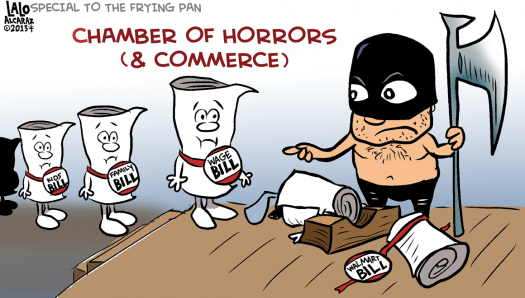

The California Chamber of Commerce represents more than 13,000 businesses, from companies such as Microsoft and Walt Disney, to local companies with small numbers of employees. From its K Street headquarters in Sacramento, the “Cal Chamber,” as it’s colloquially known, analyzes some 3,000 pieces of legislation every year. In the past 10 years, 341 of 353 — nearly 97 percent — of the bills opposed by the California Chamber of Commerce failed to become law. The vast majority of these were never passed by the Legislature and sent to the Governor. Instead, they were killed in committee or voted down by the Legislature or amended to take out provisions opposed by the chamber.
The chamber’s weapon of choice is its highly publicized “Job Killers List,” a roll call of bills the chamber claims threaten the interests of business, though its press releases tend to stress the bills’ menace to California’s economy and its workers’ jobs.
» Read more about: DOA: Behind the Chamber of Commerce’s “Job Killers” List »

the age of the innerview dawns and the need
to be first is muted by a
multitude of passings/desire honed so sharp
the edges bleed, lips and hands
assume a silent patience/at rest as a savage
brilliance is reborn in this ancient ravaged griot
who am i? what am i? are no longer important questions.
knowing that i am is finally enough
like discovering dessert is delicious following a disastrous
meal, a sweetness that reawakens
the palate, or finding that one’s chalice is unexpectedly
filled with elixir of euphoria
and i stumble happily into the cornucopia, arms
outstretched, upturned, drunk
my heart athrum, bones full samba. the night
blesses me with his constellations
baptizes me with his deathless autumnal chill
and i invade the moody indigo
full-throated and singing
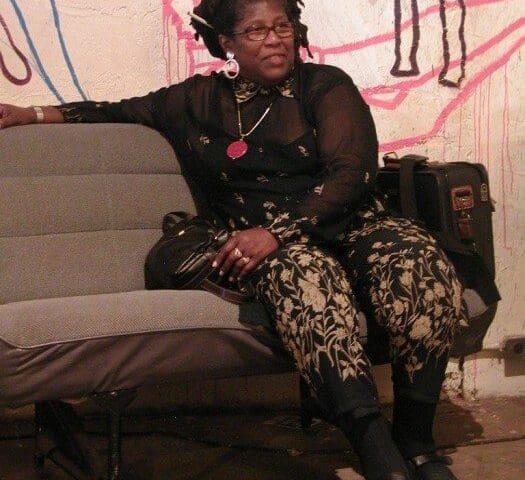

Over the past week, since Wanda Coleman’s untimely death at 67, admirers have been remembering her formidable body of work, her electrifying readings – and her identification with the city she called her home. Growing up in Watts in the 1950s, she experienced not only discrimination but also taunts by other black children because of her dark skin and untamable hair—which she describes in Bathwater Wine as “threads within coils within knots within twists.”
As a child, she took refuge in books, although not necessarily in libraries. (One poem describes a white librarian policing her through the stacks.) Her love of language sustained Coleman through her struggles to earn a living as a single mother, to cope with the death of a son and her own ill health. She did not choose an easy path. Furthermore, the West Coast is a hard place for any poet to make her name.
But Los Angeles gave Coleman a vocabulary and a landscape that she in turn made her own.
» Read more about: can’t let go of it: Appreciating Wanda Coleman »
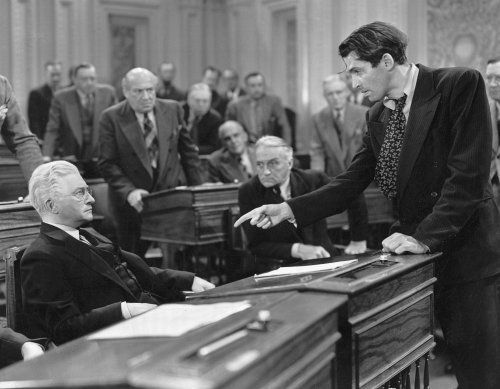
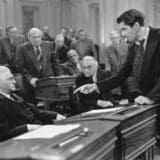
1. “Buy American” Law. AB 1543, introduced by Luis A. Alejo (D-Salinas), would have created a billion-dollar market for goods manufactured in California by requiring that, starting in 2014, at least 70 percent of state and local agency procurement be spent on manufactured goods made in the United States. Failed 04/27/12 deadline to move to fiscal committee.
2. Minimum Wage COLA Law. AB 10, introduced by Luis A. Alejo (D-Watsonville), would have automatically indexed state minimum wage increases to inflation. Held in Assembly Appropriations 5/27/11; failed deadline. (Subsequently, AB 10, raising minimum wage to $10 by 2016, was signed by Governor Jerry Brown earlier this year.)
3. Wage Theft Lien Law. AB 2517, or the California Wage Lien Bill, introduced by Mike Eng (D-Monterey Park), would have expanded the Mechanics Lien Law to allow workers from all industries to file a lien without an attorney for unpaid labor against the property where the work was done.
» Read more about: Capitol Punishment: Nine Good Bills the Cal Chamber Wanted Killed »


Driving past Echo Park the other day I saw a cat convulsing in the road. It had plainly been hit by a car and was, hopefully, near death. I considered backing up and driving over the poor thing to end its misery, but I didn’t have the strength.
Francis Underwood, played by Kevin Spacey, finds himself in a similar situation in the opening scene of the Netflix series, House of Cards. He strangles a wounded creature (a dog) as he tells us there are two kinds of pain—that which makes you stronger and that which has no purpose and is thus just suffering.
Read Mark Fainaru-Wada and Steve Fainaru’s League of Denial and I promise you’ll be convinced there’s a third, perhaps more complicated category—suffering whose purpose is collective pleasure, incriminating participant and observer simultaneously.
The risks of repeated blows to the head are obvious and have been known for some time.


While growing up an American Catholic, I learned to tune out the Vatican, which had the air of Old World irrelevancy. The pope, I thought, was just the Catholic Church’s version of Queen Elizabeth, some doddering old monarch with no real power. The uncharismatic Pope Paul VI was a case in point, a kind of Millard Fillmore of the papacy. But instead of some dude with a bad 19th century haircut embroiled in states’ rights debates, this was an old Italian guy in a white dress. Same difference. But what did it have to do with my world?
Well, plenty as it turned out, for my boyhood coincided with the implementation of Pope John XXIII’s Vatican II reforms, which did in fact alter my world—in important ways. For a 9-year-old those important changes included permission to wear sneakers and T-shirts into church, the folk mass, no Latin classes — and an interesting lesson in architecture as the new circular churches that began to appear were more like theater in the round vs.
» Read more about: Pope Francis: Is God Actually in the House? »
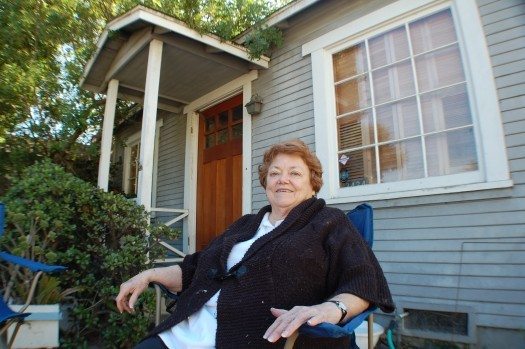

It’s official: America has entered a retirement crisis. Or, as Forbes understatedly put it, “the greatest retirement crisis in the history of the world.”
Frying Pan News recently spoke with some former state, county and municipal workers for a picture of how their retirements have been living up to their expectations.
Norma Anders, Long Beach
Retired career librarian Norma Anders’ eyes light up when she speaks of her 30 years in the City of Los Angeles’ public library system. “We make a big difference,” she declares proudly. “We’re one of the forces that’s giving our country an educated workforce, an informed citizenry. [It’s how] we’re going to be able to keep our [nation] growing and growing.”
Anders is having her morning tea in the well-manicured front yard of the modest clapboard house she shares with her retired husband, David, and her son Lee, who has moved back home while he finishes an accounting degree at Long Beach State.
» Read more about: Pension Shock: Interviews With Three Retired Public Employees »


In 2011, the University of California, Berkeley Center for Labor Research and Education put out a study that should have sparked mass rallies up and down the Golden State. The report found that nearly half of California workers will retire in or near poverty. In other words, a state once synonymous with the American Dream of economic opportunity and security is on a path to become a purgatory for millions of seniors.
It’s hard to square this alarming fact with the revelation last month that a group of mostly ultra-conservative electeds and activists will try to place a statewide measure on the 2014 ballot that would slash the pensions of government workers. The group, headed by San Jose Mayor Chuck Reed, includes Texas billionaire John Arnold, who has made “pension reform” a personal crusade.
The initiative would not only cut the retirement benefits of future public sector workers,
» Read more about: What State Pension Slashers Really Want »
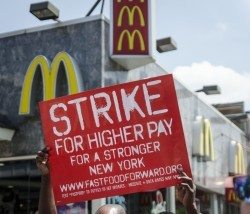
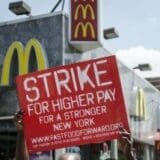
Following on the heels of last week’s Black Friday protests at Walmart stores, American fast-food workers plan one-day strikes in 100 cities Thursday. The figure represents a doubling of last year’s actions.
In addition, according to the New York Times’ Steven Greenhouse, demonstrations are planned for another 100 cities. On Sunday Greenhouse wrote:
The movement, which includes the groups Fast Food Forward and Fight for 15, is part of a growing union-backed effort by low-paid workers — including many Walmart workers and workers for federal contractors — that seeks to focus attention on what the groups say are inadequate wages.
The fast-food effort is backed by the Service Employees International Union and is also demanding that restaurants allow workers to unionize without the threat of retaliation.
Much of the fast-food strikes’ focus will be on pushing state minimum wages to $15 per hour.
» Read more about: Workers to Super-Size Fast-Food Strikes Thursday »


(This article was reported in partnership with the Investigative Fund of the Nation Institute. It first appeared on The Nation’s website and is republished with permission.)
The call from the temp agency comes in late October. I’ve passed the drug test, cleared the background check, sat down for a quick interview—“Can you lift fifty-pound boxes?”—and completed a worksheet of basic math problems. Now there’s a job. A warehouse just outside the city of Ontario, about forty miles east of Los Angeles, needs more bodies to meet the holiday crush.
They do work for Walmart, Best Buy, “all sorts of big companies,” says the female voice on the line. Orientation starts at 8:15 am; pay is $9 an hour. “Make sure you’re early.” Before hanging up she repeats the order. “Be early.”
On an overcast Tuesday, I pull into the parking lot,
» Read more about: Eyewitness: Working Inside an Inland Empire Warehouse »


Bursting out of ourselves,
rush of coat and elbow,
we rode over, over
Jimmy Damour, standing guard in the dawn —
the door yanked from its socket.
We rode as though on horseback
in the direction of our wanting.
They say you lay in a sleep of bronze
on the white linoleum,
while we shopped for TVs.
You a stone in the current of us.
Like water, indifferent, serpentine,
we carved the earth,
with our urgent business.
They say you shielded a pregnant woman
with your body,
that beneath the weight of us
she heard the grinding of her own teeth.
I’d like to say that because of you, Jimmy,
we make do with less.
It would suit my miserly heart
to cut, extract, leave out,


For a list of Black Friday actions planned nearest you, go to https://blackfridayprotests.org/
» Read more about: Walmart Braces for Black Friday Protests Today »


» Read more about: Happy Thanksgiving — Eat (Not Shop) Till You Drop! »